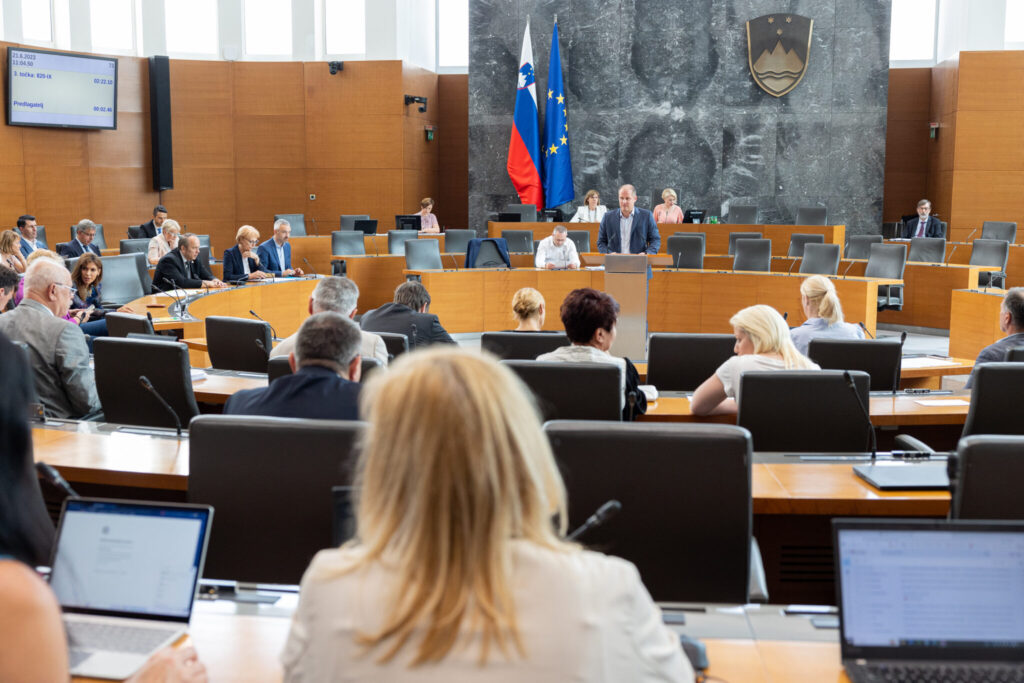“A historic decision, which is also a reformist decision.” This is how the leader of the Freedom Movement party (Gibanje Svoboda) parliamentary group, Borut Sajovic, announced that he would support his party’s proposed nationalisation of supplementary health insurance, which has not been compulsory so far. “The situation in healthcare is worse than it was a year ago. And not because the opposition is telling you so. This is what your head from the Prime Minister’s Strategic Council for Health, and the Minister of Health Erik Brecelj, they told you the same thing. This law does not solve anything, it maintains supplementary health insurance at the same level as before, and it also takes significant additional funds from the state budget, thus also threatening the stability of public finances,” Zvonko Černač announced on behalf of the Slovenian Democratic Party (Slovenska demokratska stranka – SDS) that they would vote against the bill.
“This law is a big scam. Most people think they will pay less than before, but the opposite is true. The law says precisely, as whoever has read it carefully already knows, that they will pay more. And then even more every year. What they will not pay directly from their net wages, net earnings and net pensions, they will pay indirectly through the Slovenian budget, where the government has already secured a buffer of up to 240 million euros,” Janez Cigler Kralj (New Slovenia party – Nova Slovenija; NSi) argued and announced his vote against the law.
MP Krivec mistakenly voted in favour of the law
According to these announcements, 49 MPs from the coalition parties Freedom Movement, Social Democrats (Socialni demokrati – SD), and the Left party (Levica) voted in favour of the nationalisation of the hitherto voluntary health insurance, while 29 from the opposition SDS and NSi parties voted against it. The Deputy Speaker of the National Assembly, Danijel Krivec (SDS), also voted in favour of the law, but made a mistake in his vote. His wrong vote, however, did not affect the outcome. Earlier, the ruling party had rejected an amendment to make the nationalisation effective as early as September, which the Freedom Movement parliamentary group had first proposed, but the government then managed to delay the implementation until the new year. The NSi party had already proposed the entry into force in September in order to prevent the insolvency of insurance companies before the New Year, which are currently carrying out this insurance when they have to pay more, and at the same time, the government had forbidden an increase in insurance premiums. The vote at the last reading on the bill resulted in the following: from the coalition Freedom Movement party, 39 MPs voted in favour of the law, and two were absent from the vote or abstained. All 7 MPs from the coalition SD party voted in favour, while 4 MPs of the coalition Left party also voted in favour, and one was absent. The representatives of the Italian and Hungarian minorities both abstained from the vote, while 22 MPs of the SDS party voted against, four abstained and, as previously mentioned, Krivec made a mistake when voting and voted in favour of the vote. Seven MPs of the opposition NSi party also voted against the law, while four were not present at the vote, thus bringing up the tally to 51 votes in favour and 29 votes against.
Meanwhile, MPs amended the law on political parties with a much more unanimous vote of 57 votes to none, providing more money to parties with MPs for their operations and election campaigns, reducing fines for infringements and changing the way state subsidies are calculated, which will be less generous to parties without representatives in the National Assembly after the next elections.
MPs also amended the Agriculture Act to allow the government to collect price data from agricultural producers, processors and sellers. Namely, it wants to find out why prices in shops have risen and are higher here than in Italy, so that it can take action in this area in the future.


